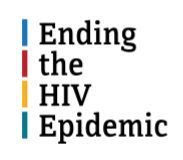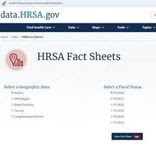
Ending the HIV Epidemic by 2030

Speaking before a panel of key advocates on Feb. 27, HRSA Administrator Dr. George Sigounas broadly outlined a plan to have BPHC and HAB jointly work in high-risk jurisdictions to stop the HIV epidemic in the U.S. within a decade. He was among senior HHS leaders to speak in a department-wide address last month.
If funded, the plan would rely on HRSA to "play a leading role" through its flagship HIV/AIDS, Primary Care and 340B drug discounting programs, Dr. Sigounas said, in addition to the CDC, NIH, IHS and SAMHSA.
New Rural Communities Opioid Response Program Funding Opportunity

HRSA's Federal Office of Rural Health Policy has released the Notice of Funding Opportunity for a new Rural Communities Opioid Response Program (RCORP) initiative called RCORP-Implementation (HRSA-19-082). HRSA plans to award approximately 75 grants to rural communities as part of this funding opportunity.
You can review the funding opportunity at grants.gov.
Successful RCORP-Implementation award recipients will receive up to $1 million for a three-year period of performance to enhance and expand substance use disorder (SUD), including opioid use disorder (OUD), service delivery in high-risk rural communities. Award recipients will implement a set of core SUD/OUD prevention, treatment, and recovery activities that align with the U.S. Department of Health and Human Services' (HHS) Five-Point Strategy to Combat the Opioid Crisis (PDF – 76 KB)
|
HRSA Recipient Webcast on “Ending the HIV Epidemic” Initiative: March 13

During the State of the Union Address last month, the Administration announced a bold new initiative “Ending the HIV Epidemic: A Plan for America.” If funds are appropriated by Congress, this is a ten-year initiative beginning in fiscal year (FY) 2020 to achieve the important goal of reducing new HIV infections to less than 3,000 per year by 2030. This level of reduction would essentially mean that HIV transmissions would be rare and meet the definition of ending the epidemic.
An informational webcast for HRSA recipients on “Ending the HIV Epidemic: A Plan for America” will be held on Wednesday, March 13, from 2:00-3:00 p.m. ET. This event will provide HRSA recipients with details about the goals and objectives of the Ending the HIV Epidemic initiative and will discuss HRSA’s critical role in this initiative.
|
National Women and Girls HIV/AIDS Awareness Day: March 10

HRSA will recognize National Women and Girls HIV/AIDS Awareness Day on March 10. For HRSA’s Ryan White HIV/AIDS Program (RWHAP), this observance provides an opportunity to raise awareness about the importance of HIV care and treatment services for women and girls, a population that disproportionately faces HIV-related health disparities.
Of the more than half a million clients served by RWHAP in 2017, 27.1 percent were female. Approximately 85.2 percent of female clients receiving RWHAP HIV medical care were virally suppressed, which is slightly lower than the national RWHAP average (85.9 percent).
|
Release of Maternal Mortality Summit Technical Report

Maternal mortality remains a universally recognized public health priority, despite efforts and some success in addressing this issue. HRSA held a Maternal Mortality Summit last June to highlight the importance of this critical public health issue and to examine challenges and innovative solutions to reduce maternal mortality in the United States and globally.
Following the Summit, HRSA staff developed a report on the meeting and its outcomes and key findings, HRSA Maternal Mortality Summit: Promising Global Practices to Improve Maternal Health Outcomes. The report documents opportunities for future collaboration and recognizes the need for more research to identify predictors of maternal mortality and effective interventions in regions throughout the world.
|
80% by 2018 National Achievement Award Grand Prize Winner: NOELA Community Health Center

The 80% by 2018 National Achievement Award recognizes dedicated individuals and organizations who advance needed initiatives to reach the national goal of regularly screening 80% of adults age 50 or over for colorectal cancer. The National Colorectal Cancer Roundtable recently recognized six honorees with the 80% by 2018 National Achievement Award, including awarding HRSA-funded NOELA Community Health Center the grand prize.
Join a HRSA webinar to hear from other HRSA-funded health centers that have successfully raised their screening rates.
Colorectal Cancer Screening: Different Paths to 80%
Monday, March 18 2:00-3:00 p.m. ET Join the webcast the day of the session Call-in: 888-233-9404 Passcode: 3790815 |
HRSA Fact Sheets

The FY 2018 HRSA Fact Sheets are now available on data.hrsa.gov.
The Fact Sheets are downloadable PDF files that provide summary data about HRSA’s major programs nationally, and by state, county, and Congressional district.
We welcome your feedback at data@hrsa.gov.
|
Unscreened, 50,000 to Die in 2019

Actor and CDC spokesman Terrence Howard lost his mother to colorectal cancer when she was 56 – the age group that produces the highest rate of new cases. Despite decades of steady gains against the disease, failure by those in their fifties to get screened continues to drive colorectal deaths.
While colorectal cancer screenings have been increasing in recent years – particularly among Medicare patients – less than half of people age 50 to 64 have received the recommended check-up. And Asian- and Hispanic-Americans are at especially high risk, experts said in a recent webcast.
Colorectal cancer, the second leading cause of cancer-related deaths in the U.S., is expected to kill more than 50,000 people this year.
March
Funding OpportunitiesHealth Centers
New Access Points (NAP) - Apply by March 12
Service Area Competition-Additional Area (SAC-AA) — Pago Pago, American Samoa - Apply by April 11
Health Workforce
Nurse Education, Practice, Quality and Retention (NEPQR) – Veteran Nurses in Primary Care (VNPC) Training Program - Apply by March 8
Rural Residency Planning and Development Program - Apply by March 25
Nurse Anesthetist Traineeship (NAT) Program - Apply by April 15
Geriatrics Academic Career Award Program - Apply by April 16
Healthcare Systems Bureau
Poison Center Network - Apply by April 10
HIV/AIDS
Ryan White HIV/AIDS Program Part C Capacity Development Program - Apply by March 22
Enhancing Linkage of STI and HIV Surveillance Data in the Ryan White HIV/AIDS Program (RWHAP) - Apply by April 8
Strengthening Systems of Care for People Living with HIV and Opioid Use Disorder - Apply by April 16
Ryan White HIV/AIDS Program Part F Dental Reimbursement Program - Apply by April 25
Maternal & Child Health
Pediatric Emergency Care Applied Research Network (PECARN) - Apply by March 8
Innovations in Care Coordination for Children and Youth with Autism Spectrum Disorders and Other Developmental Disabilities Program - Apply by March 8
Pediatric Mental Health Care Access Program - Apply by March 11
Emergency Medical Services for Children Targeted Issues Program - Apply by April 11
Transforming Health Care for Children and Youth with Epilepsy - Apply by April 11
Innovations in Access to Care for Children and Youth with Epilepsy - Apply by April 22
Networks for Oral Health Integration within the Maternal and Child Health Safety Net - Apply by April 29
Rural Health
Licensure Portability Program - Apply by March 11
Rural Residency Planning and Development Program - Apply by March 25
Rural Health and Economic Development Analysis - Apply by March 27
Medicare Rural Hospital Flexibility Program - Apply by March 29
Medicare Rural Hospital Flexibility Program – Emergency Medical Services Supplement - Apply by April 5
Small Health Care Provider Quality Improvement Program - Apply by April 22
Rural Communities Opioid Response Program-Evaluation - Apply by May 6
Rural Communities Opioid Response Program-Implementation - Apply by May 6
|





















.png)









No hay comentarios:
Publicar un comentario